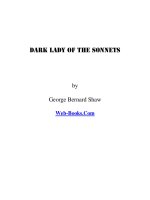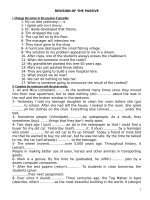Lady of the lake
Bạn đang xem bản rút gọn của tài liệu. Xem và tải ngay bản đầy đủ của tài liệu tại đây (902.13 KB, 293 trang )
TheProjectGutenbergEBookofLadyoftheLake,bySirWalterScott
ThiseBookisfortheuseofanyoneanywhereatnocostandwith
almostnorestrictionswhatsoever.Youmaycopyit,giveitawayor
re-useitunderthetermsoftheProjectGutenbergLicenseincluded
withthiseBookoronlineatwww.gutenberg.net
Title:LadyoftheLake
Author:SirWalterScott
Editor:WilliamVaughnMoody
ReleaseDate:March9,2009[EBook#28287]
Language:English
***STARTOFTHISPROJECTGUTENBERGEBOOKLADYOFTHELAKE***
ProducedbyBrianSogard,stormandtheOnlineDistributed
ProofreadingTeamat
Transcriber'sNotes:
Obvious mistakes and punctuation errors have been
corrected, but inconsistent spelling, punctuation and
hyphenationhasbeenretained.Attheendofthetext
thereisalistofthecorrectionsthatweremade.
Thefootnotesintheintroductionhavebeenmovedto
theendofthechapter,andhavebeenrenumberedfor
clarity.
Note links for the poem have been added to this
version.
TheLakeEnglishClassics
REVISEDEDITIONWITHHELPSTOSTUDY
THE
LADYOFTHELAKE
BY
SIRWALTERSCOTT
EDITEDFORSCHOOLUSE
BY
WILLIAMVAUGHNMOODY
SOMETIMEASSISTANTPROFESSOROFENGLISH
THEUNIVERSITYOFCHICAGO
SCOTT,FORESMANANDCOMPANY
CHICAGOATLANTANEWYORK
COPYRIGHT1899,1919
BYSCOTT,FORESMANANDCOMPANY
292.46
Mapoftheareawherethepoemtakesplace
THESCENEOF"THELADYOFTHELAKE"
CONTENTS
PAGE
MAP
INTRODUCTION
I. LifeofScott
Scott'sPlaceintheRomantic
II.
Movement
III. TheLadyoftheLake
HistoricalSetting
GeneralCriticismandAnalysis
TEXT
NOTES
APPENDIX
HelpstoStudy
ThemeSubjects
SelectionsforClassReading
ClassesofPoetry
6
9
39
46
48
59
251
265
269
270
271
I.LIFEOFSCOTT
I
WalterScottwasborninEdinburgh,August15,1771,ofanancientScotchclan
numberinginitstimemanyahardriderandgoodfighter,andmorethanoneof
thesepettychieftains,half-shepherdandhalf-robber,whomadegoodthewinter
inroads into their stock of beeves by spring forays and cattle drives across the
English Border. Scott's great-grandfather was the famous "Beardie" of Harden,
socalledbecauseaftertheexileoftheStuartsovereignshesworenevertocut
his beard until they were reinstated; and several degrees farther back he could
point to a still more famous figure, "Auld Wat of Harden," who with his fair
dame,the"FlowerofYarrow,"ismentionedinTheLayoftheLastMinstrel.The
first member of the clan to abandon country life and take up a sedentary
profession,wasScott'sfather,whosettledinEdinburghasWritertotheSignet,a
position corresponding in Scotland to that of attorney or solicitor in England.
Thecharacterofthisfather,stern,scrupulous,Calvinistic,withahighsenseof
ceremonial dignity and a punctilious regard for the honorable conventions of
life, united with the wilder ancestral strain to make Scott what he was. From
"Auld Wat" and "Beardie" came his high spirit, his rugged manliness, his
chivalric ideals; from the Writer to the Signet came that power of methodical
labor which made him a giant among the literary workers of his day, and that
delicate sense of responsibility which gave his private life its remarkable
sweetnessandbeauty.
At the age of eighteen months, Scott was seized with a teething fever which
settled in his right leg and retarded its growth to such an extent that he was
slightly lame for the rest of his life. Possibly this affliction was a blessing in
disguise, since it is not improbable that Scott's love of active adventure would
haveledhimintothearmyorthenavy,ifhehadnotbeendeterredbyabodily
impediment;inwhichcaseEnglishhistorymighthavebeenagainer,butEnglish
literature would certainly have been immeasurably a loser. In spite of his
lameness, the child grew strong enough to be sent on a long visit to his
grandfather's farm at Sandyknowe; and here, lying among the sheep on the
windy downs, playing about the romantic ruins of Smailholm Tower,[1]
scamperingthroughtheheatheronatinyShetlandpony,orlisteningtostoriesof
the thrilling past told by the old women of the farm, he drank in sensations
whichstrengthenedboththehardinessandtheromanticismofhisnature.Astory
istoldofhisbeingfoundinthefieldsduringathunderstorm,clappinghishands
at each flash of lightning, and shouting "Bonny! Bonny!"—a bit of infantile
intrepiditywhichmakesmoreacceptableastoryofanothersortillustrativeofhis
mentalprecocity.Aladyenteringhismother'sroomfoundhimreadingalouda
descriptionofashipwreck,accompanyingthewordswithexcitedcommentsand
gestures."There'sthemastgone,"hecried,"crashitgoes;theywillallperish!"
The lady entered into his agitation with tact, and on her departure, he told his
motherthathelikedtheirvisitor,because"shewasavirtuoso,likehimself."To
heramusedinquiryastowhatavirtuosomightbe,hereplied:"Don'tyeknow?
why,'tisonewhowishestoandwillknoweverything."
AsaboyatschoolinEdinburghandinKelso,andafterwardsasastudentatthe
University and apprentice in his father's law office, Scott took his own way to
becomea"virtuoso";aratherqueerwayitmustsometimeshaveseemedtohis
good preceptors. He refused point-blank to learn Greek, and cared little for
Latin.Hisscholarshipwassoerraticthatheglancedmeteor-likefromthehead
tothefootofhisclassesandbackagain,accordingasluckgaveorwithheldthe
question to which his highly selective memory had retained the answer. But
outsideofschoolhourshewasintenselyatworkto"knoweverything,"sofaras
"everything" came within the bounds of his special tastes. Before he was ten
yearsoldhehadbeguntocollectchap-booksandballads.Ashegrewolderhe
readomnivorouslyinromanceandhistory;atschoolhelearnedFrenchforthe
sole purpose of knowing at first hand the fascinating cycles of old French
romance;alittlelaterhemasteredItalianinordertoreadDanteandAriosto,and
tohisschoolmaster'sindignationstoutlychampionedtheclaimofthelatterpoet
to superiority over Homer; a little later he acquired Spanish and read Don
Quixote in the original. With such efforts, however, considerable as they were
for a boy who passionately loved a "bicker" in the streets and who was famed
amonghiscomradesforbraveryinclimbingtheperilous"kittleninestanes"on
Castle Rock, he was not content. Nothing more conclusively shows the
genuineness of Scott's romantic feeling than his willingness to undergo severe
mentaldrudgeryinpursuitofknowledgeconcerningtheoldstorieddayswhich
hadenthralledhisimagination.Itwasnomoonshinesentimentalitywhichkept
him hour after hour and day after day in the Advocate's Library, poring over
musty manuscripts, deciphering heraldic devices, tracing genealogies, and
unravelingobscurepointsofScottishhistory.Bythetimehewastwenty-onehe
had made himself, almost unconsciously, an expert paleographer and
antiquarian, whose assistance was sought by professional workers in those
branchesofknowledge.CarlylehaschargedagainstScottthathepouredouthis
vast floods of poetry and romance without preparation or forethought; that his
production was always impromptu, and rooted in no sufficient past of
acquisition.Thechargecannotstand.Fromhisearliestboyhooduntilhisthirtieth
year, when he began his brilliant career as poet and novelist, his life was one
longpreparation—veryindividualanderraticpreparation,perhaps,butnonethe
lessearnestandfruitful.
In1792,Scott,thentwenty-oneyearsold,wasadmittedamemberofthefaculty
of advocates of Edinburgh. During the five years which elapsed between this
dateandhismarriage,hislifewasfulltooverflowingoffunandadventure,rich
withgenialcompanionship,andwithexperienceofhumannatureinallitswild
and tame varieties. Ostensibly he was a student of law, and he did, indeed,
devote some serious attention to the mastery of his profession. But the dry
formalities of legal life his keen humor would not allow him to take quite
seriously. On the day when he was called to the bar, while waiting his turn
among the other young advocates, he turned to his friend, William Clark, who
had been called with him, and whispered, mimicking the Highland lasses who
usedtostandattheCrossofEdinburghtobehiredfortheharvest:"We'vestood
hereanhourbytheTron,hinny,anddeilaanehasspeered[2]ourprice."Though
Scottnevermadealegalreputation,eitheraspleaderatthebarorasanauthority
uponlegalhistoryandprinciples,itcannotbedoubtedthathisexperienceinthe
Edinburghcourtswasofimmensebenefittohim.Inthefirstplace,hisstudyof
the Scotch statutes, statutes which had taken form very gradually under the
pressure of changing national conditions, gave him an insight into the politics
andsocietyofthepastnototherwisetohavebeenobtained.Ofstillmorevalue,
perhaps,wastheassociationwithhisyoungcompanionsintheprofession,and
daily contact with the racy personalities which traditionally haunt all courts of
law,andparticularlyScotchcourtsoflaw:thefirstassociationkepthimfromthe
affectationandsentimentalitywhichisthebaneoftheyouthfulromanticist;and
thesecondenrichedhismemorywithmanyanoddfigureafterwardtotakeits
place,clothedinthecolorsofagreatdramaticimagination,uponthestageofhis
stories.
Addedtotheseexperiences,therewereothersequallycalculatedtoenlargehis
conceptionofhumannature.Nottheleastamongthesehefoundinthebrilliant
literary and artistic society of Edinburgh, to which his mother's social position
gavehimentrance.Here,whenonlyalad,hemetRobertBurns,thenthepetand
idolof thefashionablecoteriesofthecapital.Hereheheard HenryMackenzie
deliveralectureonGermanliteraturewhichturnedhisattentiontotheromantic
poetry of Germany and led directly to his first attempts at ballad-writing. But
muchmorevitalthananyoralloftheseinfluences,werethoseendlesswalkingtours which alone or in company with a boon companion he took over the
neighboring country-side—care-free, roystering expeditions, which he
afterwards immortalized as Dandie Dinmont's "Liddesdale raids" in Guy
Mannering.Thirtymilesacrosscountryasthecrowflies,withnoobjectivepoint
and no errand, a village inn or a shepherd's hut at night, with a crone to sing
themanoldballadoverthefire,oragroupofhardydalesmentowelcomethem
withstoriesandcarousal—thesewereblitheadventurousdayssuchascouldnot
fail to ripen Scott's already ardent nature, and store his memory with genial
knowledge. The account of Dandie Dinmont given by Mr. Shortreed may be
takenasapicture,onlytootrueinsomeofitstouches,ofScottintheseyouthful
escapades:"Ehme,...sicanendlessfundofhumoranddrolleryashehadthen
wi' him. Never ten yards but we were either laughing or roaring and singing.
Whereverwestoppedhowbrawliehesuitedhimsel'toeverybody!Heayedidas
thelavedid;nevermadehimsel'thegreatmanortookonyairsinthecompany.
I'veseenhimina'moodsinthesejaunts,graveandgay,daftandserious,sober
and drunk—(this, however, even in our wildest rambles, was but rare)—but
drunk or sober, he was aye the gentleman. He looked excessively heavy and
stupidwhenhewasfou,buthewasneverouto'gudehumor."Afterthis,weare
not surprised to hear that Scott's father told him disgustedly that he was better
fittedtobeafiddlingpeddler,a"gangrelscrape-gut,"thanarespectableattorney.
Asamatteroffact,however,behindthemadpranksandtheoccasionalexcesses
there was a very serious purpose in all this scouring of the country-side. Scott
was picking up here and there, from the old men and women with whom he
hobnobbed, antiquarian material of an invaluable kind, bits of local history,
immemorialtraditionsandsuperstitions,and,aboveall,preciousballadswhich
hadbeenhandeddownforgenerationsamongthepeasantry.Theseballads,thus
precariouslytransmitted,itwasScott'sambitiontogathertogetherandpreserve,
and he spared no pains or fatigue to come at any scrap of ballad literature of
whose existence he had an inkling. Meanwhile, he was enriching heart and
imagination for the work that was before him. So that here also, though in the
hair-brainedandheadywayofyouth,hewasengagedinhistaskofpreparation.
ScotthastoldusthatitwashisreadingofDonQuixotewhichdeterminedhimto
be an author, but he was first actually excited to composition in another way.
ThiswasbyhearingrecitedaballadoftheGermanpoetBürger,entitledLenore,
inwhichaskeletonlovercarriesoffhisbridetoaweddinginthelandofdeath.
Mr. Hutton remarks upon the curiousness of the fact that a piece of "raw
supernaturalism"likethisshouldhaveappealedsostronglytoamindashealthy
and sane as Scott's. So it was, however. He could not rid himself of the
fascinationofthepieceuntilhehadtranslatedit,andpublishedit,togetherwith
anothertranslationfromthesameauthor.Onestanzaatleastofthisfirsteffortof
Scottsoundsanotecharacteristicofhispoetry:
Tramp!tramp!alongthelandthey
rode,
Splash!splash!alongthesea;
Thescourgeisred,thespurdrops
blood,
Theflashingpebblesflee.
Herewecatchthetrumpet-likeclangandstaccatotrampofversewhichhewas
soontouseinawaytothrillhisgeneration.Thistinypamphletofverse,Scott's
earliest publication, appeared in 1796. Soon after, he met Monk Lewis, then
famous as a purveyor to English palates of the crude horrors which German
romanticismhadjustceasedtorevelin.Lewiswasengagedincompilingabook
ofsupernaturalstoriesandpoemsunderthetitleofTalesofWonder,andasked
Scott to contribute. Scott wrote for this book three long ballads—"Glenfinlas,"
"CadyowCastle,"and"TheGrayBrother."Thoughtaintedwiththeconventional
dictionofeighteenthcenturyverse,theseballadsarenotunimpressivepiecesof
work; the second named, especially, shows a kind and degree of romantic
imaginationsuchashislaterpoetryrathersubstantiatedthannewlyrevealed.
II
In the following year, 1797, Scott married a Miss Charpentier, daughter of a
Frenchrefugee.Shewasnothisfirstlove,thatplacehavingbeenusurpedbya
MissStuartBelches,forwhomScotthadfeltperhapstheonlydeeppassionof
hislife,andmemoryofwhomwastocometothesurfacetouchinglyinhisold
age. Miss Charpentier, or Carpenter, as she was called, with her vivacity and
quaintforeignspeech"caughthisheartontherebound";therecanbenodoubt
that, in spite of a certain shallowness of character, she made him a good wife,
and that his affection for her deepened steadily to the end. The young couple
wenttoliveatLasswade,avillagenearEdinburgh,ontheEsk.Scott,inwhom
the proprietary instinct was always very strong, took great pride in the pretty
littlecottage.Hemadeadining-tableforitwithhisownhands,plantedsaplings
intheyard,anddrewtogethertwowillow-treesatthegateintoakindofarch,
surmounted by a cross made of two sticks. "After I had constructed this," he
says,"mamma(Mrs.Scott)andIbothofusthoughtitsofinethatweturnedout
to see it by moonlight, and walked backwards from it to the cottage door, in
admirationofourmagnificenceanditspicturesqueeffect."Itwouldhavebeen
wellindeedforthembothiftheirpleasuresofproprietorshipcouldalwayshave
remainedsotouchinglysimple.
Nowthat hewasmarried,Scottwasforcedtolooka littlemoresharplytohis
fortunes. He applied himself with more determination to the law. In 1799 he
became deputy-sheriff of Selkirkshire, with a salary of three hundred pounds,
whichplacedhimatleastbeyondthereachofwant.Hebegantolookmoreand
more to literature as a means of supplementing his income. His ballads in the
TalesofWonderhadgainedhimsome reputation;thisheincreasedin1802by
thepublication,underthetitleBorderMinstrelsy,oftheballadswhichhehadfor
several years been collecting, collating, and richly annotating. Meanwhile he
waslookingaboutforacongenialsubjectuponwhichtotryhishandinalarger
way than he had as yet adventured. Such a subject came to him at last in a
manner calculated to enlist all his enthusiasm in its treatment, for it was given
him by the Countess of Dalkeith, wife of the heir-apparent to the dukedom of
Buccleugh. The ducal house of Buccleugh stood at the head of the clan Scott,
and toward its representative the poet always held himself in an attitude of
feudal reverence. The Duke of Buccleugh was his "chief," entitled to demand
from him both passive loyalty and active service; so, at least, Scott loved to
interprettheirrelationship,makingeffectiveinhisowncaseafeudalsentiment
whichhadelsewheresomewhatlapsed.Heespeciallylovedtothinkofhimself
as the bard of his clan, a modern representative of those rude poets whom the
Scottishchiefsoncekeptasapartoftheirhouseholdtochanttheexploitsofthe
clan.Nothingcouldhavepleasedhisfancymore,therefore,thanarequestonthe
partoftheladyofhischieftotreatasubjectofherassigning—namely,thedark
mischief-makingofadwarforgoblinwhohadstrayedfromhisunearthlymaster
andattachedhimselfaspagetoahumanhousehold.Thesubjectfellinwiththe
poet'sreigningtasteforstrongsupernaturalism.GilpinHorner,thegoblinpage,
thoughheprovedinthesequeladifficultcharacter toput topoeticuse,wasa
figuregrotesqueandeerieenoughtoappealeventoMonkLewis.AtfirstScott
thought of treating the subject in ballad-form, but the scope of treatment was
graduallyenlargedbyseveralcircumstances.Tobeginwith,hechancedupona
copy of Goethe's Götz von Berlichingen, and the history of that robber baron
suggested to him the feasibility of throwing the same vivid light upon the old
BorderlifeofhisancestorsasGoethehadthrownuponthatoftheRhinebarons.
Thisledhimtosubordinatethepartplayedbythegoblinpageintheproposed
story,whichwasnowwidenedtoincludeelaboratepicturesofmedievallifeand
manners, and to lay the scene in the castle of Branksome, formerly the
strongholdofScott'sandtheDukeofBuccleugh'sancestors.Theverseforminto
whichthestorywasthrownwasduetoastillmoreaccidentalcircumstance,i.e.,
Scott's overhearing Sir John Stoddard recite a fragment of Coleridge's
unpublishedpoem"Christabel."Theplacingofthestoryinthemouthofanold
harper fallen upon evil days, was a happy afterthought; besides making a
beautifulframeworkforthemainpoem,itenabledtheauthortoescapecriticism
foranyviolentinnovationsofstyle,sincethesecouldalwaysbeattributedtothe
rudeandwildschoolofpoetrytowhichtheharperwassupposedtobelong.In
thesewaysTheLayoftheLastMinstrelgraduallydevelopedinitspresentform.
Uponitspublicationin1805,itachievedanimmediatesuccess.Thevividnessof
its descriptive passages, the buoyant rush of its meter, the deep romantic glow
suffusing all its pages, took by storm a public familiar to weariness with the
decorous abstractions of the eighteenth century poets. The first edition, a
sumptuous quarto, was exhausted in a few weeks; an octavo edition of fifteen
hundred was sold out within the year; and before 1830, forty-four thousand
copies were needed to supply the popular demand. Scott received in all
something under eight hundred pounds for the Lay, a small amount when
contrasted with his gains from subsequent poems, but a sum so unusual
neverthelessthathedeterminedforthwithtodevoteasmuchtimetoliteratureas
hecouldsparefromhislegalduties;thosehestillplacedforemost,foruntilnear
thecloseofhislifeheclungtohisadagethatliteraturewas"agoodstaff,buta
poorcrutch."
AyearbeforethepublicationoftheLay,Scotthadremovedtothesmallcountry
seatofAshestiel,inSelkirkshire,sevenmilesfromthenearesttown,Selkirk,and
several miles from any neighbor. In the introductions to the various cantos of
MarmionhehasgivenusadelightfulpictureofAshestielanditssurroundings—
theswiftGlenkinnondashingthroughtheestateinadeepravine,onitswayto
join the Tweed; behind the house the rising hills beyond which lay the lovely
scenery of the Yarrow. The eight years (1804–1812) at Ashestiel were the
serenest,andprobablythehappiest,ofScott'slife.Herehewrotehistwogreatest
poems,MarmionandTheLadyoftheLake.Hismorningshespentathisdesk,
alwayswithafaithfulhoundathisfeetwatchingthetirelesshandasitthrewoff
sheetaftersheetofmanuscripttomakeuptheday'sstint.Byoneo'clockhewas,
as he said, "his own man," free to spend the remaining hours of light with his
children,hishorses,andhisdogs,ortoindulgehimselfinhislife-longpassion
fortree-planting.Hisrobustandhealthynaturemadehimexcessivelyfondofall
out-of-doorsports,especiallyriding,inwhichhewasdaringtofoolhardiness.It
isacuriousfact,notedbyLockhart,thatmanyofScott'ssenseswereblunt;he
couldscarcely,forinstance,tellonewinefromanotherbythetaste,andoncesat
quite unconscious at his table while his guests were manifesting extreme
uneasinessovertheapproachofatoo-long-kepthaunchofvenison,buthissight
wasunusuallykeen,ashishuntingexploitsproved.Hislittlesononceexplained
his father's popularity by saying that "it was him that commonly saw the hare
sitting."Whatwithhunting,fishing,salmon-spearingbytorchlight,gallopsover
thehillsintotheYarrowcountry,plantingandtransplantingofhisbelovedtrees,
Scott's life at Ashestiel, during the hours when he was "his own man," was a
veryfullandhappyone.
Unfortunately,hehadalreadyembarkedinanenterprisewhichwasdestinedto
overthrowhisfortunesjustwhentheyseemedfairest.WhileatschoolinKelso
hehadbecomeintimatewithaschoolfellownamedJamesBallantyne,andlater,
when Ballantyne set up a small printing house in Kelso, he had given him his
earliest poems to print. After the issue of the Border Minstrelsy, the
typographical excellence of which attracted attention even in London, he set
Ballantyne up in business in Edinburgh, secretly entering the firm himself as
silentpartner.ThegoodsaleoftheLayhadgiventhefirmanexcellentstart;but
more matter was presently needed to feed the press. To supply it, Scott
undertook and completed at Ashestiel four enormous tasks of editing—the
completeworksofDrydenandofSwift,theSomers'Tracts,andtheSadlerState
Papers. The success of these editions, and the subsequent enormous sale of
Scott's poems and novels, would have kept the concern solvent in spite of
Ballantyne's complete incapacity for business, but in 1809 Scott plunged
recklesslyintoanotherandmoreseriousventure.AdisputewithConstable,the
veteran publisher and bookseller, aggravated by the harsh criticism delivered
upon Marmion by Francis Jeffrey, editor of the EdinburghReview,Constable's
magazine,determinedScotttosetupinconnectionwiththeBallantynepressa
rival bookselling concern, and a rival magazine, to be called the Quarterly
Review. The project was a daring one, in view of Constable's great ability and
resources; to make it foolhardy to madness Scott selected to manage the new
businessabrotherofJamesBallantyne,adissipatedlittlebuffoon,withaboutas
much business ability and general caliber of character as is connoted by the
name which Scott coined for him, "Rigdumfunnidos." The selection of such a
man for such a place betrays in Scott's eminently sane and balanced mind a
curious strain of impracticality, to say the least; indeed, we are almost
constrainedtofeelwithhisharshercriticsthatitbetrayssomethingworsethan
defectivejudgment—defectivecharacter.Hisgreatestfailing,iffailingitcanbe
called,waspride.Hecouldnotendureeventhemilddictationsofacompetent
publisher,asisshownbyhisanswertoaletterwrittenbyoneofthemproposing
somesalariedwork;herepliedcurtlythathewasa"blackHussar"ofliterature,
andnottobeputtosuchtameservice.Probablythishaughtydislikeofdictation,
this imperious desire to patronize rather than be patronized, led him to choose
inferior men with whom to enter into business relations. If so, he paid for the
faultsodearlythatitishardforabiographertopresstheissueagainsthim.
Forthepresent,however,thewindoffortunewasblowingfair,andallthestorm
clouds were below the horizon. In 1808 Marmion appeared, and was greeted
with an enthusiasm which made the unprecedented reception of the Layseem
lukewarm in comparison. Marmion contains nothing which was not plainly
foreshadowed in the Lay, but the hand of the poet has grown more sure, his
descriptive effects are less crude and amateurish, the narrative proceeds with a
steadier march, the music has gained in volume and in martial vigor. An
anecdote is told by Mr. Hutton which will serve as a type of a hundred others
illustrative of the extraordinary hold which this poetry took upon the minds of
ordinarymen."Ihaveheard,"hesays,"oftwooldmen—completestrangers—
passing each other on a dark London night, when one of them happened to be
repeatingtohimself,justasCampbelldidtothehackneycoachmanoftheNorth
BridgeofEdinburgh,thelastlinesoftheaccountofFloddenFieldinMarmion,
'Charge,Chester,charge,'whensuddenlyareplycameoutofthedarkness,'On,
Stanley,on,'whereupontheyfinishedthedeathofMarmionbetweenthem,took
offtheirhatstoeachother,andparted,laughing."TheLadyoftheLake,which
followedinlittlemorethanayear,wasreceivedwiththesamepopulardelight,
and with even greater respect on the part of the critics. Even the formidable
Jeffrey,whowassupposedtodineoffslaughteredauthorsastheGiantin"Jack
and the Beanstalk" dined off young Englishmen, keyed his voice to unwonted
praise. The influx of tourists into the Trossachs, where the scene of the poem
waslaid,wassogreatasseriouslytoembarrassthemailcoaches,untilatlastthe
posting charges had to be raised in order to diminish the traffic. Far away in
Spain, at a trying moment of the Peninsular campaign, Sir Adam Ferguson,
postedonapointofgroundexposedtotheenemy'sfire,readtohismenasthey
layprostrateonthegroundthepassagefromTheLadyoftheLakedescribingthe
combatbetweenRoderickDhu'sHighlandersandtheforcesoftheEarlofMar;
and "the listening soldiers only interrupted him by a joyous huzza when the
French shot struck the bank close above them." Such tributes—and they were
legion—to the power of his poetry to move adventurous and hardy men, must
have been intoxicating to Scott; there is small wonder that the success of his
poemsgavehim,ashesays,"suchaheezeasalmostliftedhimoffhisfeet."
III
Scott'smodestywasnotindanger,butsofarashisprudencewasconcerned,his
successdidreallylifthimoffhisfeet.In1812,stillmoreencouragedtheretoby
entering upon the emoluments of the office of Clerk of Sessions, the duties of
whichhehadperformedforsixyearswithoutpay,hepurchasedAbbotsford,an
estateontheTweed,adjoiningthatoftheDukeofBuccleugh,hiskinsman,and
nearthebeautifulruinsofMelroseAbbey.Herehebegantocarryoutthedream
of his life, to found a territorial family which should augment the power and
fameofhisclan.Beginningwithamodestfarmhouseandafarmofahundred
acres,hegraduallybought,planted,andbuilt,untilthefarmbecameamanorial
domainandthefarmhouseacastle.Hehadnotgonefarinthisworkbeforehe
begantorealizethatthereturnsfromhispoetrywouldneversufficetomeetsuch
demands as would thus be made upon his purse. Byron's star was in the
ascendant, and before its baleful magnificence Scott's milder and more genial
light visibly paled. He was himself the first to declare, with characteristic
generosity, that the younger poet had "bet"[3] him at his own craft. As Carlyle
says,"hehadheldthesovereigntyforsomehalf-scoreofyears,acomparatively
longleaseofit,andnowthetimeseemedcomefordethronement,forabdication.
Anunpleasantbusiness;which,however,heheldhimselfready,asabraveman
will,totransactwithcomposureandinsilence."
But, as it proved, there was no need for resignation. The reign of metrical
romance,brilliantbutbrief,waspast,ornearlyso.Butwhatofproseromance,
whichlongago,inpickingoutDonQuixotefromthepuzzlingSpanish,hehad
promisedhimselfhewouldonedayattempt?Withsomesuchquestioningofthe
Fates,Scottdrewfromhisdeskthesheetsofastorybegunsevenyearsbefore,
andabandonedbecauseofthesuccessofTheLayoftheLastMinstrel.Thisstory
henowcompleted,andpublishedasWaverleyinthespringof1814—anevent
"memorable in the annals of British literature; in the annals of British
bookselling thrice and four times memorable." The popularity of the metrical
romances dwindled to insignificance before the enthusiasm with which this
prose romance was received. A moment before quietly resolved to give up his
place in the world's eye, and to live the life of an obscure country gentleman,
Scott found himself launched once more on the tide of brave fortunes. The
Ballantyne publishing and printing houses ceased to totter, and settled
themselvesonwhatseemedthefirmestoffoundations.AtAbbotsford,buying,
planting,andbuildingbeganonagreaterscalethanhadeverbeenplannedinits
owner'smostsanguinemoments.
ThehistoryofthenextelevenyearsinScott'slifeisthehistory,ontheonehand,
of the rapidly-appearing novels, of a fame gradually spreading outward from
GreatBritainuntilitcoveredthecivilizedworld—afameincreasedratherthan
diminishedbytheincognitowhichthe"authorofWaverley"tookgreatpainsto
preserveevenafterthesecrethadbecomeanopenone;ontheotherhand,ofthe
large-hearted,hospitablelifeatAbbotsford,where,inspiteoftheimportunities
ofcuriousandill-bredtourists,bentongettingaglimpseofthe"Wizardofthe
North,"andinspiteoftheenormousmassofwork,literaryandofficial,which
Scott took upon himself to perform, the atmosphere of country leisure and
merriment was somehow miraculously preserved. This life of the hearty
prosperouscountrylairdwastheonetowardtherealizationofwhichallScott's
efforts were directed; it is worth while, therefore, to see as vividly as may be,
whatkindoflifethatwas,thatwemaythebetterunderstandwhatkindofman
he was who cared for it. The following extract from Lockhart's Life of Scott
givesusatleastoneverycharacteristicaspectoftheAbbotsfordworld:
"Itwasaclear,brightSeptembermorning,withasharpnessintheairthat
doubled the animating influence of the sunshine; and all was in readiness
for a grand coursing-match on Newark Hill. The only guest who had
chalkedoutothersportforhimselfwasthestaunchestofanglers,Mr.Rose;
buthe,too,wasthereonhisshelty,armedwithhissalmon-rodandlandingnet....ThislittlegroupofWaltonians,boundforLordSomerville'spreserve,
remained lounging about, to witness the start of the main cavalcade. Sir
Walter,mountedonSibyl,wasmarshallingtheorderofprocessionwitha
huge hunting-whip; and among a dozen frolicsome youths and maidens,
who seemed disposed to laugh at all discipline, appeared, each on
horseback, each as eager as the youngest sportsman in the troop, Sir
HumphreyDavy,Dr.Wollaston,andthepatriarchofScottishbelles-lettres,
HenryMackenzie....Laidlow(thestewardofAbbotsford)onastrong-tailed
wiry Highlander, yclept Hoddin Grey, which carried him nimbly and
stoutly,althoughhisfeetalmosttouchedtheground,wastheadjutant.But
themostpicturesquefigurewastheillustriousinventorofthesafety-lamp
(Sir Humphrey Davy) ... a brown hat with flexible brim, surrounded with
lineuponlineofcatgut,andinnumerablefly-hooks;jackbootsworthyofa
Dutch smuggler, and a fustian surtout dabbled with the blood of salmon,
madeafinecontrastwiththesmartjacket,white-cordbreeches,andwellpolished jockey-boots of the less distinguished cavaliers about him. Dr.
Wollastonwasinblack;andwith hisnobleserenedignityofcountenance
mighthavepassedforasportingarchbishop.Mr.Mackenzie,atthistimein
the seventy-sixth year of his age, with a hat turned up with green, green
spectacles,greenjacket,andlongbrownleatherngaitersbuttoneduponhis
netheranatomy,woreadog-whistleroundhisneck....TomPurdie(oneof
Scott'sservants)andhissubalternshadprecededusbyafewhourswithall
the grey-hounds that could be collected at Abbotsford, Darnick, and
Melrose;butthegiantMaidahadremainedashismaster'sorderly,andnow
gamboledaboutSibylGreybarkingformerejoylikeaspanielpuppy.
"Theorderofmarchhadallbeensettled,whenScott'sdaughterAnnebroke
fromtheline,screamingwithlaughter,andexclaimed,'Papa,papa,Iknew
youcouldneverthinkofgoingwithoutyourpet!'Scottlookedround,andI
rather think there was a blush as well as a smile upon his face, when he
perceivedalittleblackpigfriskingabouthispony,evidentlyaself-elected
additiontothepartyoftheday.Hetriedtolookstern,andcrackedhiswhip
atthecreature,butwasinamomentobligedtojoininthegeneralcheers.
Poor piggy soon found a strap round its neck, and was dragged into the
background; Scott, watching the retreat, repeated with mock pathos, the
firstverseofanoldpastoralsong—
WhatwillIdoginmyhoggie
die?
Myjoy,mypride,myhoggie!
Myonlybeast,Ihadnamae,
Andwow,butIwasvogie!
—thecheerswereredoubled—andthesquadronmovedon."
Let us supplement this with one more picture, from the same hand, showing
Scott in a little more intimate light. The passage was written in 1821, after
LockharthadmarriedScott'seldestdaughter,andgonetospendthesummerat
Chiefswood,acottageontheAbbotsfordestate:
"We were near enough Abbotsford to partake as often as we liked of its
brilliant and constantly varying society; yet could do so without being
exposedtotheworryandexhaustionofspiritwhichthedailyreceptionof
new-comersentaileduponallthefamily,exceptScotthimself.Butintruth,
evenhewasnotalwaysproofagainsttheannoyancesconnectedwithsucha
style of open house-keeping.... When sore beset at home in this way, he
would every now and then discover that he had some very particular
business to attend to on an outlying part of his estate, and craving the
indulgenceofhisguestsovernight,appearatthecabinintheglenbeforeits
inhabitantswereastirinthemorning.TheclatterofSibylGrey'shoofs,the
yelpingofMustardandSpice,andhisownjoyousshoutofréveilléeunder
ourwindows,werethesignalthathehadbursthistoils,andmeantforthat
dayto'takehiseaseinhisinn.'Ondescending,hewasfoundtobeseated
with all his dogs and ours about him, under a spreading ash that
overshadowedhalfthebankbetweenthecottageandthebrook,pointingthe
edgeofhiswoodman'saxe,andlisteningtoTomPurdie'slecturetouching
the plantation that most needed thinning. After breakfast he would take
possessionofadressing-roomupstairs,andwriteachapterofThePirate;
and then, having made up and despatched his packet for Mr. Ballantyne,
awaytojoinPurdiewherevertheforesterswereatwork...untilitwastime
to rejoin his own party at Abbotsford or the quiet circle of the cottage.
Whenhisguestswerefewandfriendly,heoftenmadethemcomeoverand
meethimatChiefswoodinabodytowardsevening....Hewasreadywith
allsortsofdevicestosupplythewantsofanarrowestablishment;heused
to delight particularly in sinking the wine in a well under the braeerehe
went out, and hauling up the basket just before dinner was announced,—
thisprimitivedevicebeing,hesaid,whathehadalwayspractisedwhena
young housekeeper, and in his opinion far superior in its results to any
application of ice; and in the same spirit, whenever the weather was
sufficientlygenial,hevotedfordiningoutofdoorsaltogether."
Few events of importance except the successive appearances of "our buiks" as
TomPurdiecalledhismaster'snovels,andanoccasionalvisittoLondonorthe
continent,intervenedtobreakthebusymonotonyofthisAbbotsfordlife.Onone
ofthesevisitstoLondon,ScottwasinvitedtodinewiththePrinceRegent,and
when the prince became King George IV, in 1820, almost the first act of his
reign was to create Scott a baronet. Scott accepted the honor gratefully, as
coming,hesaid,"fromtheoriginalsourceofallhonor."Therecanwellbetwo
opinions as to whether this least admirable of English kings constituted a very
prime fountain of honor, judged by democratic standards; but to Scott's mind,
such an imputation would have been next to sacrilege. The feudal bias of his
mind,strongtostartwith,hadbeenstrengthenedbyhislongsojournamongthe
visionsofafeudalpast;theidealsoffeudalismwerelivingrealitiestohim;and
he accepted knighthood from his king's hand in exactly the same spirit which
determinedhisattitudeofhumilitytowardshis"chief,"theDukeofBuccleugh,
and which impelled him to exhaust his genius in the effort to build up a great
familyestate.
There were already signs that the enormous burden of work under which he
seemedtomovesolightly,wastellingonhim.TheBrideofLammermoor,The
Legend of Montrose, and Ivanhoe, had all of them been dictated between
screamsofpain,wrungfromhislipsbyachroniccrampofthestomach.Bythe
timehereachedRedgauntletandSt.Ronan'sWell,therebegantobeheardfaint
murmuringsofdiscontentfromhispublic,hintsthathewaswritingtoofast,and
thatthenoblewinehehadpouredthemforsolongwasgrowingatlastatrifle
watery.Toaddtothesecausesofuneasiness,thecommercialventuresinwhich
hewasinteresteddriftedagainintoaprecariousstate.Hehadhimselffalleninto
the bad habit of forestalling the gains from his novels by heavy drafts on his
publishers,andtheexamplethussetwasfollowedfaithfullybyJohnBallantyne.
Scott'sgoodhumorandhispartner'sbadjudgmentsaddledtheconcernwithalot
of unsalable books. In 1818 the affairs of the book-selling business had to be
closed up, Constable taking over the unsalable stock and assuming the
outstandingliabilitiesinreturnforcopyrightprivilegescoveringsomeofScott's
novels. This so burdened the veteran publisher that when, in 1825, a large
Londonfirmfailed,itcarriedhimdownalso—andwithhimJamesBallantyne,
with whom he had entered into close relations. Scott's secret connection with
Ballantynehadcontinued;accordinglyhewokeuponefinedaytofindhimself
worsethanbeggared,beingpersonallyliableforonehundredandthirtythousand
pounds.
IV
The years intervening between this calamity and Scott's death form one of the
saddestandatthesametimemostheroicchaptersinthehistoryofliterature.The
fragile health of Lady Scott succumbed almost immediately to the crushing
blow, and she died in a few months. Scott surrendered Abbotsford to his
creditors and took up humble lodgings in Edinburgh. Here, with a pride and
stoical courage as quiet as it was splendid, he settled down to fill with the
earnings of his pen the vast gulf of debt for which he was morally scarcely
responsible at all. In three years he wrote Woodstock, three Chronicles of the
Canongate, the Fair Maid of Perth, Anne of Geierstein, the first series of the
Tales of a Grandfather, and a Life of Napoleon, equal to thirteen volumes of
novelsize,besideseditingandannotatingacompleteeditionofhisownworks.
All these together netted his creditors £40,000. Touched by the efforts he was
making to settle their claims, they now presented him with Abbotsford, and
thitherhereturnedtospendthefewyearsremainingtohim.In1830hesuffered
a first stroke of paralysis; refusing to give up, however, he made one more
desperaterallytorecapturehisoldpowerofstory-telling.CountRobertofParis
and Castle Dangerous were the pathetic result; they are not to be taken into
account, in any estimate of his powers, for they are manifestly the work of a
paralyticpatient.Thegloomypictureisdarkenedbyanincidentwhichillustrates
strikinglyonephaseofScott'scharacter.
ThegreatReformBillwasbeingdiscussedthroughoutScotland,menacingwhat
werereallyabuses,butwhatScott,withhisintenseconservatism,believedtobe
sacredandinviolableinstitutions.Thedyingmanrousedhimselftomakeastand
against the abominable bill. In a speech which he made at Jedburgh, he was
hissedandhootedbythecrowd,andheleftthetownwiththedastardlycryof
"BurkSirWalter!"ringinginhisears.
Naturenowintervenedtoeasetheintolerablestrain.Scott'sanxietyconcerning
his debt gradually gave way to an hallucination that it had all been paid. His
friends took advantage of the quietude which followed to induce him to make
thejourneytoItaly,inthefearthattheseverewinterofScotlandwouldprove
fatal. A ship of His Majesty's fleet was put at his disposal, and he set sail for
Malta. The youthful adventurousness of the man flared up again oddly for a
moment, when he insisted on being set ashore upon a volcanic island in the
Mediterranean which had appeared but a few days before and which sank
beneaththesurfaceshortlyafter.TheclimateofMaltaatfirstappearedtobenefit
him;butwhenheheard,oneday,ofthedeathofGoetheatWeimar,heseemed
seized with a sudden apprehension of his own end, and insisted upon hurrying
backthroughEurope,inorderthathemightlookoncemoreonAbbotsford.On
the ride from Edinburgh he remained for the first two stages entirely
unconscious. But as the carriage entered the valley of the Gala he opened his
eyes and murmured the name of objects as they passed, "Gala water, surely—
Buckholm—Torwoodlee."WhenthetowersofAbbotsfordcameinview,hewas
so filled with delight that he could scarcely be restrained from leaping out. At
the gates he greeted faithful Laidlaw in a voice strong and hearty as of old:
"Why, man, how often I have thought of you!" and smiled and wept over the
dogswhocamerushingasinbygonetimestolickhishand.Hediedafewdays
later,ontheafternoonofagloriousautumnday,withallthewindowsopen,so
thathemightcatchtothelastthewhisperoftheTweedoveritspebbles.
"Andso,"saysCarlyle,"thecurtainfalls;andthestrongWalterScottiswithus
nomore.Apossessionfromhimdoesremain;widelyscattered; yetattainable;
notinconsiderable.Itcanbesaidofhim,whenhedeparted,hetookaMan'slife
alongwithhim.NosounderpieceofBritishmanhoodwasputtogetherinthat
eighteenthcenturyofTime.Alas,hisfineScotchface,withitsshaggyhonesty,
sagacityandgoodness,whenwesawitlatterlyontheEdinburghstreets,wasall
wornwithcare,thejoyallfledfromit—ploweddeepwithlaborandsorrow.We
shallneverforgetit;weshallneverseeitagain.Adieu,SirWalter,prideofall
Scotchmen,takeourproudandsadfarewell."
FOOTNOTES:
[1]SeeScott'sballad"TheEveofSt.John."
[2]Asked.
[3]Bested,gotthebetterof.
II.SCOTT'SPLACEINTHEROMANTIC
MOVEMENT
In order rightly to appreciate the poetry of Scott it is necessary to understand
something of that remarkable "Romantic Movement" which took place toward
the end of the eighteenth century, and within a space of twenty-five years
completelychangedthefaceofEnglishliterature.Boththecausesandtheeffects
ofthismovementweremuchmorethanmerelyliterary;the"romanticrevival"
penetratedeverycreviceandramificationoflifeinthosepartsofEuropewhich
itaffected;itssocial,political,andreligiousresultswerealldeeplysignificant.
But we must here confine ourselves to such aspects of the revival as showed
themselvesinEnglishpoetry.
Eighteenth century poetry had been distinguished by its polish, its formal
correctness, or—to use a term in much favor with critics of that day—its
"elegance." The various and wayward metrical effects of the Elizabethan and
Jacobeanpoetshadbeendiscardedforafewwell-recognizedverseforms,which
themselvesinturnhadbecomestillfurtherlimitedbytheapplicationtothemof
preciserulesofstructure.Handinhandwiththisrestrictingprocessinmeter,had
goneasimilartendencyindiction.Thesimple,concretephrasesofdailyspeech
hadgivenwaytostatelyperiphrases;therichandriotousvocabularyofearlier
poetryhadbeenreplacedbyonemoredecorous,measured,andhigh-sounding.
A corresponding process of selection and exclusion was applied to the subject
matterofpoetry.Passion,lyricexaltation,delightintheconcretelifeofmanand
nature, passed out of fashion; in their stead came social satire, criticism,
generalizedobservation.Whiletheclassicalinfluence,asitisusuallycalled,was
atitsheight,withsuchmenasDrydenandPopetoexemplifyit,itdidagreat
work;buttoward theendoftheeighthdecadeoftheeighteenthcenturyithad
visiblyruntoseed.ThefeebleHayley,thesillyDellaCrusca,thearidErasmus
Darwin, were its only exemplars. England was ripe for a literary revolution, a
returntonatureandtopassion;andsucharevolutionwasnotslowincoming.
It announced itself first in George Crabbe, who turned to paint the life of the
poorwithpatientrealism;inBurns,whopouredoutinhissongsthepassionof
love, the passion of sorrow, the passion of conviviality; in Blake, who tried to
reach across the horizon of visible fact to mystical heavens of more enduring
reality. Following close upon these men came the four poets destined to
accomplish the revolution which the early comers had begun. They were born
withinfouryearsofeachother,Wordsworthin1770,Scottin1771,Coleridgein
1772, Southey in 1774. As we look at these four men now, and estimate their
worth as poets, we see that Southey drops almost out of the account, and that
WordsworthandColeridgestand,sofarasthehighestqualitiesofpoetrygo,far
above Scott, as, indeed, Blake and Burns do also. But the contemporary
judgment upon them was directly the reverse; and Scott's poetry exercised an
influenceoverhisageimmeasurablygreaterthanthatofanyoftheotherthree.
Letusattempttodiscoverwhatqualitiesthispoetrypossessedwhichgaveitits
astonishingholdupontheagewhenitwaswritten.Insodoing,wemaydiscover
indirectlysomeofthereasonswhyitstillretainsalargeportionofitspopularity,
andperhapsarriveatsomegroundsofjudgmentbywhichwemaytestitsright
thereto.
One reason why Scott's poetry was immediately welcomed, while that of
WordsworthandofColeridgelayneglected,istobefoundinthefactthatinthe
matter of diction Scott was much less revolutionary than they. By nature and
education he was conservative; he put The Lay of the Last Minstrel into the
mouthofarudeharperoftheNorthinordertoshieldhimselffromthechargeof
"attemptingtosetupanewschoolinpoetry,"andheneverthroughouthislife
violatedtheconventions,literaryorsocial,ifhecouldpossiblyavoiddoingso.
This bias toward conservatism and conventionality shows itself particularly in
the language of his poems. He was compelled, of course, to use much more
concreteandvividtermsthantheeighteenthcenturypoetshadused,becausehe
was dealing with much more concrete and vivid matter; but his language,
nevertheless, has a prevailing stateliness, and at times an artificiality, which
recommended it to readers tired of the inanities of Hayley and Mason, but
unwilling to accept the startling simplicity and concreteness of diction
exemplifiedbytheLakepoetsattheirbest.
AnotherpeculiarityofScott'spoetrywhichmadepowerfullyforitspopularity,
was its spirited meter. People were weary of the heroic couplet, and turned
eagerlytothesehurriedverses,thatwentontheirwaywiththesharptrampof
moss-troopers, and heated the blood like a drum. The meters of Coleridge,
subtle, delicate, and poignant, had been passed by with indifference—had not
beenheardperhaps,forlackofearstrainedtohear;butScott'smetricaleffects
weresuchasachildcouldappreciate,andasoldiercouldcarryinhishead.
Analogoustothistreatmentofmeter,thoughbelongingtoalessformalsideof
his art, was Scott's treatment of nature, the landscape setting of his stories.
Perhapsthemostobviousfeatureoftheromanticrevivalwasareawakeningof
interestinout-doornature.Itwasasifforahundredyearspastpeoplehadbeen
strickenblindassoonastheypassedfromthecitystreetsintothecountry.Atrim
garden, an artfully placed country house, a well-kept preserve, they might see;
but for the great shaggy world of mountain and sea—it had been shut out of
man's elegant vision. Before Scott began to write there had been no lack of
prophets of the new nature-worship, but none of them of a sort to catch the
generalear.Wordsworth'spantheismwastoomystical,toodelicateandintuitive,
to recommend itself to any but chosen spirits; Crabbe's descriptions were too
minute,Coleridge'stoointense,toplease.Scottwasthefirsttopaintnaturewith
a broad, free touch, without raptures or philosophizing, but with a healthy
pleasure in its obvious beauties, such as appeal to average men. His "scenery"
seldom exists for its own sake, but serves, as it should, for background and
settingofhisstory.AshisreadersfollowedthefortunesofWilliamofDeloraine
or Roderick Dhu, they traversed by sunlight and by moonlight landscapes of
wild romantic charm, and felt their beauty quite naturally, as a part of the
excitementofthatwildlife.Theyfeltitthemorereadilybecauseofatouchof
artificial stateliness in the handling, a slight theatrical heightening of effect—
fromanabsolutepointofviewadefect,buthighlycongenialtothetasteofthe
time. It was the scenic side of nature which Scott gave, and gave inimitably,
whileBurnswaspiercingtotheinnerheartofhertendernessinhislines"Toa
Mountain Daisy" and "To a Mouse," while Wordsworth was mystically
communing with her soul, in his "Tintern Abbey." It was the scenic side of
natureforwhichtheperceptionsofmenwereripe;sotheyleftprofounderpoets
to their musings, and followed after the poet who could give them a brilliant
storysetinabrilliantscene.
Again,theemotionalkeytoScott'spoetrywasonacomprehensibleplane.The
situations with which he deals, the passions, ambitions, satisfactions, which he
portrays,belong,inoneformoranother,toallmen,oratleastareeasilygrasped
by the imaginations of all men. It has often been said that Scott is the most
HomericofEnglishpoets;sofarastheclaimrestsonconsiderationsofstyle,it
ishardlytobegranted,fornothingcouldbefartherthanthehurryingtorrentof
Scott's verse from the "long and refluent music" of Homer. But in this other
respect, that he deals in the rudimentary stuff of human character in a
straightforwardway,withoutahintofmoderncomplexitiesandsuper-subtleties,
heisreallyakintothemasterpoetofantiquity.This,addedtothecrudewildlife
whichhepictures,thevigoroussweepofhisaction,thesincereglowofromance
whichbatheshisstory—allsotonicintheireffectuponmindslongusedtothe
stuffydecorumofdidacticpoetry,completedthetriumphofTheLayoftheLast
Minstrel,Marmion,andTheLadyoftheLake,overtheirage.
Ashasbeenalreadysuggested,Scottcannotbeputinthefirstrankofpoets.No
compromise can be made on this point, because upon it the whole theory of
poetrydepends.Neitherontheformalnorontheessentialsidesofhisartishe
among the small company of the supreme. And no one understood this better
than himself.Hetouchedthekeynoteofhisownpower,though withtoogreat
modesty, when he said, "I am sensible that if there is anything good about my
poetry...itisahurriedfranknessofcompositionwhichpleasessoldiers,sailors,
andyoungpeopleofboldandactivedispositions."ThepoetCampbell,whowas
sofascinatedbyScott'sballadof"CadyowCastle"thatheusedtorepeatitaloud
ontheNorthBridgeofEdinburghuntil"thewholefraternityofcoachmenknew
him by tongue as he passed," characterizes the predominant charm of Scott's
poetry as lying in a "strong, pithy eloquence," which is perhaps only another
namefor"hurriedfranknessofcomposition."Ifthisisnotthehighestqualityto
whichpoetrycanattain,itisaveryadmirableone;anditwillbeasaddayfor
the English-speaking race when there shall not be found persons of every age
andwalkoflife,totakethesamedelightsinthesestirringpoemsastheirauthor
loved to think was taken by "soldiers, sailors, and young people of bold and
activedispositions."
III.THELADYOFTHELAKE
1.HISTORICALSETTING
TheLadyoftheLakedealswithadistinctepochinthelifeofKingJamesVof
Scotland, and has lying back of it a considerable amount of historical fact, an
understanding of which will help in the appreciation of the poem. During his
minority the King was under the tutelage of Archibald Douglas, sixth Earl of
Angus, who had married the King's mother. The young monarch chafed for a
longtimeunderthisauthority,buttheDouglasesweresopowerfulthathewas
unable to shake it off, in spite of several desperate attempts on the part of his
sympathizerstorescuehim.In1528theKing,thensixteenyearsofage,escaped
fromhisowncastleofFalklandtoStirlingCastle.ThegovernorofStirling,an
enemyoftheDouglasfamily,receivedhimjoyfully.Theresoongatheredabout
hisstandardasufficientnumberofpowerfulpeerstoenablehimtodeposethe
EarlofAngusfromtheregencyandtobanishhimandallhisfamilytoEngland.
The Douglas who figures in the poem is an imaginary uncle of the banished
regent, and himself under the ban, compelled to hide away in the shelter
providedforhimbyRoderickDhuonthelonelyislandinLochKatrine.Heis
representedashavingbeenlovedandtrustedbyKingJamesduringtheboyhood
of the latter, before the enmity sprang up between the house of Angus and the
throne. This enmity, to quote from the History of the House of Douglas,
publishedatEdinburghin1743,"wassoinveterate,thatnumerousastheirallies
were,theirnearestfriends,eveninthemostremotepartsofScotland,durstnot
entertainthem,unlessunderthestrictestandclosestdisguise."
The outlawed border chieftain, Roderick Dhu, who gives shelter to the
persecutedDouglas,isafictitiouscharacter,butoneentirelytypicalofthetime
and place. The expedition undertaken by the young King against the Border
clans,undertheguiseofahuntingparty,isinpart,atleast,historic.Pitscottie's
Historysays:"In1529JamesVmadeaconventionatEdinburghforthepurpose
of considering the best mode of quelling the Border robbers, who, during the
license of his minority and the troubles which followed, had committed many
exorbitances. Accordingly, he assembled a flying army of ten thousand men,
consisting of his principal nobility and their followers, who were directed to
bring their hawks and dogs with them, that the monarch might refresh himself









